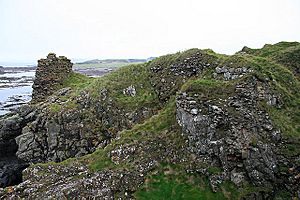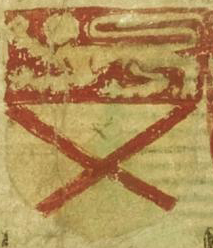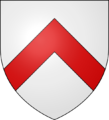Earl of Carrick facts for kids
Quick facts for kids Earldom of Carrick |
|
|---|---|
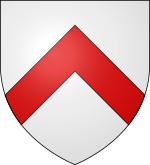
The red chevron of Carrick
|
|
| Creation date | 1186 |
| Monarch | William the Lion |
| Peerage | Peerage of Scotland |
| First holder | Duncan |
| Present holder | Prince William, Duke of Rothesay |
| Heir apparent | Prince George |
| Former seat(s) | Turnberry Castle |
The Earl of Carrick is a very old and important title in Scotland. It belongs to the ruler of a region called Carrick, which is now part of South Ayrshire.
This title became very special because of Robert the Bruce. He inherited the title from his mother's family. Later, he became the King of the Scots in the early 1300s.
Since the 1400s, the title of Earl of Carrick has automatically gone to the person who is next in line to become king or queen. This person is called the heir apparent. Today, the current holder of this title is Prince William, who is also known as the Duke of Rothesay.
Contents
Who Were the First Earls of Carrick?
The Earldom of Carrick started in 1186. It was part of a larger area called the Lordship of Galloway. This lordship covered what is now Galloway and the southern part of Ayrshire.
The Lords of Galloway were like rulers of their own small kingdom. They had their own laws, even though they recognized the King of Scots as their main leader.
The first known Lord was Fergus, who died in 1161. He had two sons, Uchtred and Gille Brigte. They shared the land, as was the custom back then.
In 1174, the brothers joined King William the Lion in a fight against England. But when King William was captured, the people of Galloway rebelled. Uchtred stayed loyal to the Scottish king. Sadly, he was killed by Gille Brigte's son. Gille Brigte then took control of all of Galloway.
King William was freed in 1175. He marched his army into Galloway to bring Gille Brigte to justice. But he decided to just make Gille Brigte pay a fine, and Gille Brigte was not harmed.
How Duncan Became the First Earl
In 1176, Gille Brigte made a deal with King Henry II of England. He became King Henry's loyal follower. In return, he paid a large sum of money and gave his son Duncan as a hostage. For the next ten years, Gille Brigte attacked King William's lands, protected by the English king.
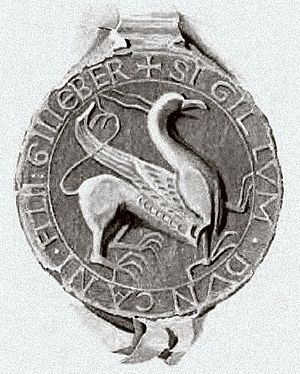
When Gille Brigte died in 1185, there was a lot of trouble in Galloway. Roland, Uchtred's son, defeated Gille Brigte's supporters. He built forts to secure his power.
This made King Henry of England angry. He prepared to invade. But war was avoided when Roland, King William, and King Henry met. They agreed that Roland would rule most of Galloway. Gille Brigte's son, Duncan, would rule the northern part, which was called Carrick.
Duncan agreed to this plan. He gave up his claims to the rest of Galloway. This is how Duncan became the very first Earl of Carrick.
Marjorie and Robert the Bruce's Parents
Duncan's son or grandson, Niall, became the next Earl. Niall's oldest daughter, Marjorie, inherited the title after him. She became the Countess of Carrick in her own right.
Marjorie first married Adam de Kilconquhar. In 1269, Adam went on a religious journey to the Holy Land as part of the Eighth Crusade. He never came back, dying from a disease in 1270.
The next year, Marjorie met Robert de Brus while he was hunting. A famous story says that Marjorie kept Robert prisoner until he agreed to marry her! They got married at Turnberry Castle. They did this without their families knowing and without the king's permission.
When King Alexander III found out, he took away Marjorie's castles and lands. But she later paid a fine, and Robert was recognized as her husband and the Earl of Carrick. The term jure uxoris means "by right of his wife."
Marjorie and Robert had many children. Their most famous son was Robert, who would later become King of Scotland.
Royal Earls of Carrick
Marjorie and Robert were followed by their oldest son, Robert. When the old royal family of Scotland ended, this Robert, known as "the Bruce," became a main person who could claim the throne. He was a great-great-great-great-grandson of King David I.
Robert the Bruce was crowned King of Scotland in 1306. When he became king, his Scottish titles, including Earl of Carrick, became part of the Crown. This means the king held the title.
Around 1313, King Robert made his younger brother, Edward, the Earl of Carrick. Edward did not have any legitimate children. So, when he died in 1318, the title of Earl of Carrick ended.
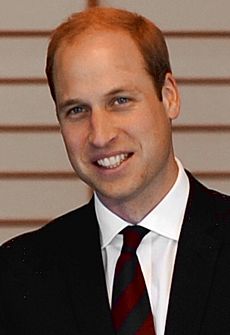
The title was briefly held by Robert's son, David, before he became king. In 1332, the title was given to Alexander, who was Edward's son born outside of marriage. However, Alexander was killed in battle the next year, and the title ended again.
In 1368, King David gave the title of Earl of Carrick to his great-nephew, John Stewart. King David died unexpectedly in 1371 without children. So, his nephew Robert Stewart, John's father, became king. When Robert II died in 1390, John became King Robert III. This meant the Earldom of Carrick again became part of the Crown.
The next person to hold the title was Robert III's son, David. He was also made Duke of Rothesay and Earl of Atholl. David died in 1402 without children. The Earldom was then given to his brother, James. James was usually known by his higher title, Prince or Great Steward of Scotland. James became king in 1406, and his titles merged with the Crown.
The Title for the Heir to the Throne
In 1469, the Scottish Parliament passed a law. This law said that the king's oldest son and the person next in line to the throne would automatically hold the Earldom of Carrick. They would also hold the Dukedom of Rothesay.
After Scotland and England joined their crowns, these titles have been held by the oldest son and heir to the throne of Great Britain. So, today, the current Duke of Rothesay and Earl of Carrick is Prince William.
List of Earls of Carrick
Here are some of the people who held the title of Earl of Carrick:
Early Rulers
- Gille Brigte (died 1185), ruled Carrick but did not have the official title of Earl.
- Donnchadh, Earl of Carrick (died 1250)
- Niall, Earl of Carrick (died 1256)
- Marjorie, Countess of Carrick (died 1292)
Bruce Earls
- Robert Bruce (1292–1314), became King Robert I of Scotland in 1306.
- Edward Bruce (1314–1318), Robert's brother. He also became High-King of Ireland in 1315.
- The title returned to the Crown.
- David Bruce (1328–1330) – became King David II of Scotland in 1329.
- Alexander de Brus, Earl of Carrick (1330–1333), Edward Bruce's son born outside of marriage.
- The title returned to the Crown.
Stewart Earls
- Robert Stewart, Earl of Carrick (1316–1390) [became King Robert II of Scotland in 1371, the first king from the House of Stewart]
- John Stewart, Earl of Carrick (around 1368–1390) [became King Robert III of Scotland in 1390]
- David Stewart, Duke of Rothesay (1398–1402)
- The title returned to the Crown.
- James Stewart, Duke of Rothesay (1404–1437) [became King James I of Scotland in 1406]
Later Earls
For more recent Earls of Carrick, you can look at the article about the Duke of Rothesay.
Images for kids
See also
- Earl of Orkney
- Ayrshire (Earl of Carrick's Own) Yeomanry
- Duchy of Cornwall
 | Anna J. Cooper |
 | Mary McLeod Bethune |
 | Lillie Mae Bradford |


